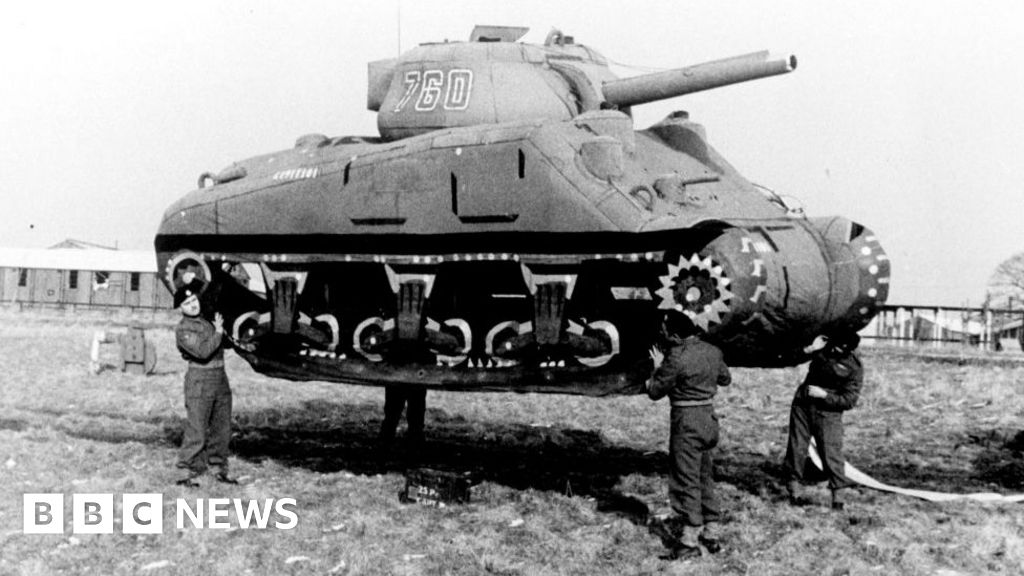Yard sales in philadelphia
Watch: The ‘Ghost Army’ veterans who tricked the Nazis in WW2
By Bernd Debusmann Jr
BBC News, Washington
Nearly 80 years after World War Two, members of secretive US units have been honoured for the clever ruses they used to save tens of thousands of lives.
Known as the “Ghost Army”, the group used inflatable vehicles and Hollywood-level special effects to fool the Germans about Allied war plans.
President Joe Biden signed a bill to award Congress’ highest honour to the Ghost Army in 2022.
Three ageing veterans were honoured at an event in Congress on Thursday.
Seymour Nussenbaum,100, John Christman, 99, and Bernard Bluestein, 100, attended the ceremony on Capitol Hill. Four other members are still alive, but were unable to join the others.
Speaking from his wheelchair, Mr Bluestein told the audience of lawmakers: “I am very proud and happy to be here.”
Like many of the group’s members, Mr Nussenbaum came from art school. Others were drawn from advertising and public relations firms.
His job included putting fake numbers on jeeps to confuse the enemy and dressing people up to impersonate US generals and have them walk around in order to be seen by spies.
“Our job was to make whatever was necessary to deceive the enemy,” he told BBC News.
“Our mission was to fool the enemy,” he told AP News. “To put on a big act.”
Image source, Getty Images
Inflatable rubber tanks were part of sophisticated deception operations aimed at confusing the German army about Allied intentions.
The Ghost Army included about 1,100 soldiers in the 23rd Headquarters Special Troops unit, which operated in Western Europe, and another 200 soldiers from the 3133rd Signal Company Special in Italy.
Over the course of more than 20 deception campaigns, the Ghost Army used costumes and props as well as a massive fleet of inflatable tanks, trucks and aircraft to confuse the German army about the size and location of Allied troops, luring them to redeploy forces to other parts of the front line.
In one 1945 mission, dubbed Operation Viersen, members of the Ghost Army successfully tricked the Germans into believing that two divisions – 40,000 men – were set to cross the Rhine 10 miles (16km) from the actual crossing point.
To do so, the unit set up hundreds of inflatable trucks and tanks, blasted the sounds of troop movements from loudspeakers and simulated military radio traffic.
Additionally, some members posed as military commanders in areas they knew German spies would detect their presence. Ultimately, the real Rhine crossing met minimal resistance.
“I guess we were successful, because the Germans fired upon us,” Mr Bluestein told the Washington Post. “We convinced them we were the real thing.”
Similar operations using inflatable decoys were used before Allied forces landed in North Africa in 1941 and 1942, in Italy in 1943 and just before the D-Day landings in Normandy in 1944.
After the war, the US Army credited the Ghost Army with saving the lives of between 15,000 and 30,000 soldiers from May 1944 to the end of the war a year later. Its mission, however, remained classified until 1996.
Mr Nussenbaum says he rarely ever talks about his experience during the war, telling the BBC: “I don’t like to beat my own drum.”
Mr Bluestein says he always would tell his family he did “camouflage work” during the war.
“The dangerous part I didn’t tell them about. They wouldn’t have liked it,” he said with a chuckle.
Congresswoman Ann McLane Kuster, who helped lead the effort to honour the unit, said during the ceremony that many of America’s WW2 veterans – like her father pilot who was shot down during the war – did not say much about their time in the service.
“One of my favourite lines was one gentleman who would only tell his family, ‘I blew up tanks,’ without saying they were inflatable,” she said of the Ghost Army troops.
A lobbying effort led by author and film producer Rick Beyer ultimately culminated in President Biden signing legislation to award the units with the Congressional Gold Medal – Congress’ highest award – in 2022.
“I just wanted to make sure it’s not forgotten,” Mr Beyer told the AP. “I think it’s a great use of ingenuity, creativity on the battlefield.”
Additional reporting by Alexandra Ostasiewicz and Eva Artesona
